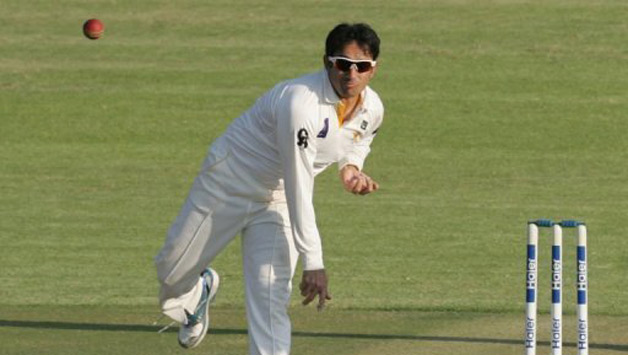
Abhishek Mukherjee
Abhishek Mukherjee is the Chief Editor at CricketCountry. He blogs at ovshake dot blogspot dot com and can be followed on Twitter @ovshake42.
Written by Abhishek Mukherjee
Published: Sep 09, 2014, 01:23 PM (IST)
Edited: Sep 09, 2014, 01:42 PM (IST)


Following numerous speculations Saeed Ajmal has finally been suspended from bowling by the International Cricket Council (ICC). Abhishek Mukherjee explains why this is another setback to the wonderful sport.
In a country famous for breeding youngster Saeed Ajmal made his Test debut rather late, and became the third bowler to start his career after 30 and still pick up a hundred wickets (178 at the time of writing the article). One must remember that Ajmal never had a chance to play at home. Barring Shane Warne no one had taken as many Test wickets away from home after they had turned 30 (if one combines formats, his tally of 443 wickets is way clear of Muttiah Muralitharan’s 330).
With flatter bowlers resurfacing again, quality off-spin — for that matter, any spin — could have been a dying art after the retirement of Murali. Instead, there resurfaced, from the land of Murali himself, Rangana Herath, and the Pakistani at the wrong side of 30.
Saqlain Mushtaq and Mushtaq Ahmed had made spin fashionable in Pakistan in the 1990s, but it had become a dying art after the erratic career of Danish Kaneria. Then came the Faisalabad Wizard, with his slow-stop run-up, guile, variation, and his ability to outfox the greatest of batsmen. Ajmal became a champion, and suddenly the Ajmal-vs-Herath arguments came up in discussions over the greatest contemporary spinner.
[read-also]185177,185201,170057[/read-also]
Then the blow happened: Ajmal was banned from bowling completely. There have been critics (Michael Vaughan perhaps the most eminent among them), but one did not expect a complete ban; the cricket fraternity perhaps expected a series of tests similar to the ones performed on Murali.
Following Murali’s action ICC was forced to redefine the laws of the sport. The 15° law (“A statement concerning the legality of the bowling action with respect of the amount of elbow extension measured and the 15 degree elbow extension tolerance threshold should then follow”, says Annexure 1.1, Law 18 regarding the procedures to be executed following the biomechanical tests).
Ajmal did not pass the test. He was banned. ICC had changed the laws subsequent to the allegations against Murali. They are yet to do the same for Ajmal, and if they do not, one of the finest careers will prematurely fade into oblivion, albeit at a later stage than Ian Meckiff’s had.
Whether the ICC will change its laws is debatable. In the era of underarm bowling, John Willes was called for bowling over-arm in 1822; he had his horse waiting outside the ground; the moment he was called, he immediately left the ground, never to return. Over-arm bowling was legalised in 1864 (the year is, as a result, unanimously considered by cricket historians as the beginning of the “modern era of cricket”).
The world had perhaps lost several champion bowlers before the year. We will never know. In the coming years we may lose out on a few Ajmals, the way we had lost on Meckiff. Thousand of bowlers with dubious actions (as per contemporary laws) get lost in wilderness.
Maybe, just like over-arm bowling, “chucking” may be legalised a few decades from now. In all probability that will happen after Ajmal bows out of the sport. We may again lose a few potential champions in the interim period. But as of now, we are on the verge of losing Ajmal — one of the finest bowlers the third millennium has seen. It is not good news for the sport and its fans.
Complete coverage of Saeed Ajmal’s suspension here
(Abhishek Mukherjee is the Editorial Head and Cricket Historian at CricketCountry. He blogs here and can be followed on Twitter here.)
This website uses cookies so that we can provide you with the best user experience possible. Cookie information is stored in your browser and performs functions such as recognising you when you return to our website and helping our team to understand which sections of the website you find most interesting and useful.
Strictly Necessary Cookie should be enabled at all times so that we can save your preferences for cookie settings.
If you disable this cookie, we will not be able to save your preferences. This means that every time you visit this website you will need to enable or disable cookies again.
